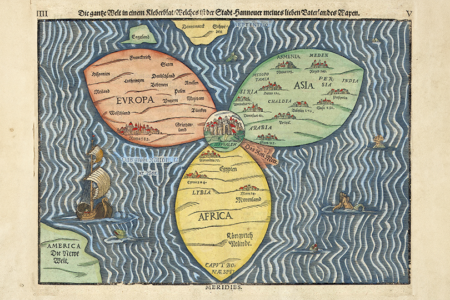The Life, Times And Message Of Isaiah The Prophet Dec/Jan 1971/1972
CYRUS APPOINTED TO DELIVER ISRAEL FROM BABYLON
ISAIAH CHAPTER 45
Verses I-7 Jehovah will grant victory to Cyrus, for the sake of His people
1 Thus says the LORD to his anointed, to Cyrus,
Whom I have taken by his right hand,
To subdue nations before him,
And to render kings helpless,
To open doors before him,
And to keep the gates from being shut again.
2 I will go before thee and make the crooked places straight,
I will break the doors of brass,
And cut in pieces the iron gates.
3 I will give thee the treasures of darkness,
And the hidden riches of secret places,
That thou mayest know that I am the LORD,
He who, calls thee by thy name, the God of Israel.
4 For the sake of my servant Jacob and for Israel my chosen one,
Have I called thee by thy name, and have surnamed thee,
Although thou hast not known me.
5 I am the LORD, and there is none other,
Beside me there is no God.
I have girded thee, though thou hast not known me.
6 That they may know from the rising to the setting of the sun,
That there is none beside me,
I am the LORD and there is none else.
I form the light and create darkness,
I make peace and create evil,
I the LORD do all this.
Comment:
This is the only instance in Scripture in which a gentile ruler is referred to as Mashiach – Anointed one, a title of honor reserved for the kings and the high priests of Israel, and for the Savior par excellence, the Messiah (see Deut. 7:14). Here Cyrus is designated by this title as God’s chosen agent who is to deliver Israel from Babylonian bondage.
Herodotus described how Cyrus conquered the supposedly impenetrable city of Babylon, the greatest and richest metropolis of Asia. (See note 1, to chapter 44). In comparison with the cruel Assyrians and Babylonians, Cyrus and his dynasty were enlightened and humane rulers. After the capture of Babylon in 539 BC., he encouraged the Jews and many other captive peoples, including the Assyrians, to return to their homeland, and even contributed generously to the rebuilding of the Temple in Jerusalem. (2 Chron. 36:22, 23. Ezra 1:2; 5:13; 6:3,4).
The Cyrus Cylinder which was excavated at the site of ancient Babylon in 1882, records.
“Marduk….looked through all the countries searching for a righteous ruler…He pronounced the name of Cyrus…and declared him to be the ruler of the world.”
This characterization of Cyrus is in harmony with Isaiah 45:1a.
1. To render kings helpless before him…
Lit. “to ungird the loins of kings,” that is, to loosen their belts to which their weapons were attached, thus rendering them helpless. The opposite of this phrase is “to gird.”
2. The doors of brass…the bars of iron
Herodotus, who in his worldwide travels visited Babylon, declared: There are a hundred gates to the circuit of the wall, all of bronze with bronze uprights and lintels.1′
3. The treasures of darkness … the hidden riches….
Babylon, the world center of commerce, the mistress of Mesopotamia, was rich beyond all calculation. Her fabulous treasurer were hoarded in the secret vaults of her famous temples and palaces. Even private citizens could deposit their wealth in the temple vaults against a receipt. Thus the Babylonian temples were the forerunners of our modern banks.
4. For the sake of my servant Jacob … I have called thee by thy name
The victories of Cyrus were for the sake of Israel, beloved for their fathers’ sake, even in their state of rebellion. Just as the Assyrians and the Babylonians were formerly used to punish Israel, so Cyrus would now be the agent of divine compassion, to set them free. Jehovah singled out Cyrus, calling him by name, as testimony to Himself, to Israel, and to the nations of the world, that He alone is the omnipotent, omniscient and sovereign God, the God of the impossible .
7 I form light and create darkness …
This verse is singularly appropriate for Cyrus, because the Persians believed that the world is ruled by two gods, Ahura Mazda, the god of light and goodness, and Ahriman, the god of darkness and evil. Our verse declares that Jehovah is the author of both, of light and darkness, of peace and evil. The contasting of evil as the opposite of peace is most significant for the prophetic mind. the events of history and their strange convolutions are ultimately traceable to Jehovah.
A Brief Hymn
8 Pour down you heavens from above,
And the skies rain down righteousness.
Let the earth open up and bring forth salvation,
I the LORD, have created it.
Comment:
This brief hymn is in anticipation of the Messianic times when salvation and justice will fill the earth.
Verses 9-13 An answer to those who question the ways of the Lord.
9 Woe to him who contends with his Maker,
A potsherd among earthen potsherds.
Shall the clay say to the potter: “What art thou doing?”
Or, “thy work has no hands.”
10 Woe to him who says to his father: “what hast thou begotten?”
Or to his mother: “to what hast thou given birth?”
11 Thus says the LORD, the Holy One of Israel and his Maker,
Would you question me concerning the things which are to come?
Or command me concerning my sons and the works of my hands?
12 I alone made the earth,
And the men upon it, I have created.
My own hands have stretched forth the heavens,
And I have ordered all its hosts.
13 I myself have also raised him up to righteousness,
And I will make level all his ways.
He will rebuild my city, and send my exiles free,
Not for a price, nor for a bribe, says the LORD of hosts.
Comment:
This passage seems to be directed against some of the exiles who apparently resented that Jehovah should use Cyrus, a pagan ruler, to deliver Israel, instead of a Davidic king.
9 Woe to him who contends with his Maker
To do so is an act of hubris, of supreme arrogance. It is like a mere shard daring to talk back to the potter.
10 Thy work it has no hands
This seems to have been a common expression still used today among some Jews, to describe something which does not make sense. The enormity of this impious act is brought out by comparing it to a child questioning his parents why they conceived him or gave birth to him.
11 Would you question me?
It is outrageous for man (finite in wisdom and knowledge), to question God concerning His ways or to tell Him how to deal with His children. Just leave these things with the God who created heaven and earth and man himself.
13 I have raised him up in righteousness
The same God who created the universe, has also appointed Cyrus to set the exiles free and to rebuild Jerusalem, “my city.” Cyrus will do it of his own free will and not for a bribe.
Verses 14-17 The nations shall turn to the God of Israel
14 Thus says the Lord:
The toil of Egypt and the wealth of Ethiopia,
Of the Sabeans, men of stature,
Shall come over to thee and be thine,
They shall go after thee and come over in fetters,
They shall fall down before thee, and implore thee:
Surely God is in thy midst and there is none other,
There is no other God.
15 Truly thou art a God who hidest thyself,
The God of Israel, the Savior.
16 They shall be ashamed and confounded all of them,
The makers of idols shall go in confusion.
17 But Israel shall be saved by the LORD
With an everlasting salvation.
They shall never, no never, be ashamed or confounded.
Comment:
14. The toll of Egypt and the wealth of Ethiopia . . shall come over to thee
To whom does Jehovah address Himself? A rather difficult question to answer. At first glance Israel would seem to be the addressee, but Israel never waged war against Egypt or Ethiopia. Cyrus would appear to be the more logical addressee. But neither did Cyrus himself conquer Egypt and Ethiopia. This conquest was left to Cambyses, the son of Cyrus. The only satisfactory answer is that this prophecy has an eschatological character. It is a vision of the ultimate
Things which will come to pass at the end of times. At that time the nations will voluntarily come over to the God of Israel. Verse 14 corresponds to the message of Isaiah 2:2-4. The history of redemption is telescoped to dramatize the ultimate purpose of God.
15 Truly thou art a God who hidest thyself
The actions of Jehovah, His seemingly strange ways are not easily discernible to him who has not learned to walk in the Lord’s paths, nor to trust Him. The pagan deities were conspicuous, of monumental proportions. Not so Jehovah. He is discernible only to the eye of faith. Yet He is the Savior of Israel those who trust in Him shall never be ashamed.
Verses 18-25 Look unto me all the ends of the earth
18 For thus says the LORD, who created the heavens,
He is God,he formed the earth and made it, he established it.
He did not create it to be a void, but formed it to be inhabited,
I am the LORD and there is none other.
I have not spoken in secret, in a dark place.
I did not say to the children of Jacob: “seek me in vain.”
I the LORD speak righteousness,
I declare things which are right.
Gather yourselves together, come and draw near, you survivors of the nations. They who carry around the wood of their graven images, they do not know, All they who pray to a god who cannot help.
21 Come forward and declare, yes, take counsel together:
Who has declared all this from ancient time?
Who has foretold this of old?
Was it not I, Jehovah?
There was no other God beside me,
A God who is just and a Savior,
There is none beside me.
22 Look unto me and be you saved all the ends of the earth,
For I am God and there is none other.
23 I have sworn by myself,
The word of righteousness has gone forth out of my mouth.
It will not return void
That unto me every knee shall bow, every tongue shall swear:
24 Surely only in Jehovah, shall one say,\Is there righteousness and strength.
And to him shall all they who defied him come and be ashamed.
25 But in the LORD shall all the seed of Israel
Be justified and glory.
Comment:
The above passage constitutes one of the highpoints of the book of Isaiah, and reaches out beyond Israel to embrace all of humanity in God’s infinite and salvation. It is a magnificent declaration concerning the sovereignty and majesty of the LORD and His redemptive purpose for all men.
18 For thus says the LORD who created the heavens and formed the earth..
The purpose of the Creator is not that the earth should be primordial (wasteland – tohu), as at creation, but to be inhabited by men. However, unless men turn from their wickedness and idol worship to the service of God, the earth would revert to her primeval condition and become a wasteland.
19 I have not spoken in secret … in a dark place
Unlike the obscure and mumbling utterances of the idol worshipping prognosticators, the revelation of Jehovah is clear and just; it is accessible to all men and not just to a few, who are initiated, as in the pagan mysteries.
I did not say to the seed of Jacob: “seek you me in vain”
Israel was not condemned to a hopeless and fruitless search for God, as for instance the Athenians, who in their search for God, erected an altar dedicated to the Unknown God (Acts 17 :23). The God of Israel speaks that which is just and right.
20-23 These verses constitute an invitation to all men to, turn to God and live. It is an evangelistic appeal unsurpassed in beauty and grandeur. It is later echoed in the Gospel.
20 Gather yourselves together and come
An invitation to the pagan survivors, those who will remain at the clysmic end of time. The call is addressed to all idol worshippers who around their wooden images and pray to a god who cannot help them,
21 Jehovah ….. a righteous God and a Savior
In contrast to the pitiful idols who have to be carried about by the shippers, Jehovah is omnipotent and omniscient, the God who makes kno future far in advance. Isaiah repeatedly emphasizes the reality of Jehovah by pointing to predictive prophecy as an integral part of divine revelation which authenticates the true prophet.
22 Look unto me, and be you saved, all the end of the earth
Here is one of the climactic points of prophecy. Jehovah’s love is not limited to Israel alone, God cares for all of humanity and invited all men to “look unto me and be saved.” The text contradicts all those who maintain that the the Old Testament is a cruel narrow minded and narrow hearted God. The word of Isaiah brings to mind the words of Jesus: “Come unto me all ye that labor and are heavy laden, and I will give you rest” Matt. 11:28.
23 I have sworn by myself
This is the expression of God’s immutable will to accomplish His purpose. The first line of the parallelism is followed by the second:
The word of righteousness has gone forth from my mouth · · it will not return void
The meaning here is the same as in Isaiah 55:11
So shall my word be that goes forth out of my mouth
It shall not return unto me void.
God’s word of righteousness is His eternal plan and purpose. It is the eternal, creative inviolable Logos which abides forever.
That unto me shall every knee bow, every tongue shall swear
God’s ultimate purpose is that all men should come to a saving knowledge of Him and acknowledge Him as sovereign and supreme Lord.
24 Only in the LORD…..is righteousness and strength
This will be the ultimate confession of repentant humanity, acknowledging God as righteous and the only one who is able to save.
To him shall all they who defied him come and be ashamed
(lit. were burned up against him)
They who always defied God will in the end be compelled to come to Him and confess with shame that they were misguided.
25 The prophet sums up his message to his people saying in essence, that in spite of all their soul-shattering experiences and sins, Israel will in the end be justified in their faith and will glory in Jehovah. God will not let His people down.
ENDNOTE
- Herodotus, ibid, 1,179 p. 85, Penguin ed.







